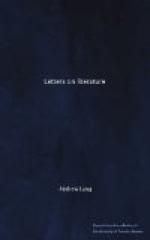“Like Dian’s kiss, unasked,
unsought,
Love gives itself, but is not bought.”
Excellent; but there are four weak, moralizing stanzas at the close, and not only does the poet “moralize his song,” but the moral is feeble, and fantastic, and untrue. There are, though he denies it, myriads of persons now of whom it cannot be said that
“Some heart, though unknown,
Responds unto
his own.”
If it were true, the reflection could only console a school-girl.
A poem like “My Lost Youth” is needed to remind one of what the author really was, “simple, sensuous, passionate.” What a lovely verse this is, a verse somehow inspired by the breath of Longfellow’s favourite Finnish “Kalevala,” “a verse of a Lapland song,” like a wind over pines and salt coasts:
“I remember the black wharves
and the slips,
And the sea-tide,
tossing free,
And Spanish sailors with bearded
lips,
And the beauty and the mystery of
the ships,
And the magic
of the sea.”
Thus Longfellow, though not a very great magician and master of language—not a Keats by any means—has often, by sheer force of plain sincerity, struck exactly the right note, and matched his thought with music that haunts us and will not be forgotten:
“Ye open the eastern windows,
That look towards
the sun,
Where thoughts are singing swallows,
And the brooks
of morning run.”
There is a picture of Sandro Botticelli’s, the Virgin seated with the Child by a hedge of roses, in a faint blue air, as of dawn in Paradise. This poem of Longfellow’s, “The Children’s Hour,” seems, like Botticelli’s painting, to open a door into the paradise of children, where their angels do ever behold that which is hidden from men—what no man hath seen at any time.
Longfellow is exactly the antithesis of Poe, who, with all his science of verse and ghostly skill, has no humanity, or puts none of it into his lines. One is the poet of Life, and everyday life; the other is the poet of Death, and of bizarre shapes of death, from which Heaven deliver us!
Neither of them shows any sign of being particularly American, though Longfellow, in “Evangeline” and “Hiawatha,” and the “New England Tragedies,” sought his topics in the history and traditions of the New World.
To me “Hiawatha” seems by far the best of his longer efforts; it is quite full of sympathy with men and women, nature, beasts, birds, weather, and wind and snow. Everything lives with a human breath, as everything should live in a poem concerned with these wild folk, to whom all the world, and all in it, is personal as themselves. Of course there are lapses of style in so long a piece. It jars on us in the lay of the mystic Chibiabos, the boy Persephone of the Indian Eleusinia, to be told that
“the gentle
Chibiabos
Sang in tones of deep emotion!”




